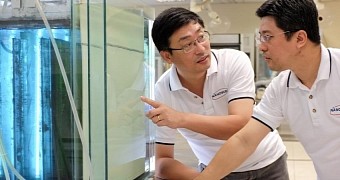Filters are serious business, since they often stand between you and sicknesses. Their ability to do their job (cleaning air, water, or whatever else) determines the likelihood of you catching a sickness on the job or at home when drinking water from the tap.
A company from Singapore, by the name of Nano Sun, has just created a water filter membrane that not only does its job as well as you might hope, but it's not likely to break down anytime soon either.
You see, eventually we might see the 3D printed membrane technology used for commercial, consumer filters. The sort you can use on a hiking trip to purify spring water, instead of purification tablets.
However, in the short term, the company intends for its new filter membranes to be used in humanitarian relief projects in developing countries and by an industrial paper mill in Guangzhou, China, where it will optimize water treatment processes.
Furthermore, the new membrane will be used by Indonesian firm PT Pelaksana Jaya Mulia to provide clean water to people (around 10,000 cubic meters a day).
The 3D printed filter membrane
Nanofiltration is the type of water filtration that needs a very high pressure, but also produces the best and safest result. Micro and ultra-filtration aren’t exactly safe for drinking water, depending on where the water comes from.
Normally, membranes for water filtration are made from plastic, ceramic, or stainless steel. Not only does this make them expensive, but also likely to break down over time or in extreme heat and cold. Even ultraviolet light can harm them, which is a sore point since UV is often used to disinfect water.
The new 3D printed membrane avoids all these pitfalls (yes, even the likelihood of breaking down) because it is made of titanium oxide.
It's safe to say that Associate Professor Darren Sun from Nanyang Technological University’s (NTU) School of Civil and Environmental Engineering will definitely get recognition for all this, since it was his invention.
Moreover, the titanium oxide allows water to more easily pass through. And that's not all. Apparently, the membrane can clean itself as well, since it has natural anti-bacterial and anti-fouling properties.
Great benefits all around
Low price and ease of production are very strong points here, in addition to efficiency and endurance. With water filtration often happening at low temperatures, the last point is especially important.
No wonder the Prime Minister’s Office, the Public Utilities Board (PUB), NTU, and private investors are investing millions of dollars into Nano Sun. Sure, the $2 million / €1.55 million grant might not seem like much for a company that already has a value of $80 million / €62 million, but every bit helps.

 14 DAY TRIAL //
14 DAY TRIAL //